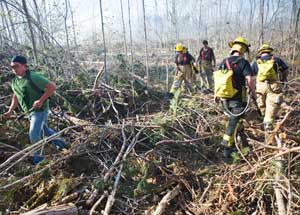
May 16, 2015
Statewide burn ban extended
 Joe McIntyre/staff photographer
Joe McIntyre/staff photographerFirefighters with water-filled backback pumps put out hot spots at the scene of the May 7 brush fire on state land in Chenango County. Most of the firefighting efforts were conducted on foot because of the dense layer of brush covering the ground. Because of dry conditions, the state has extended the ban on residential brush burning through May 21.
A series of large brush fires and continued dry conditions across New York have prompted the state to extend the residential brush burn ban until Thursday, but local officials say that conditions in Cortland County indicate that this area is out of the danger zone.
A high fire danger burn ban, which prohibits outdoor fires such as campfires, recreational fires and outdoor fires used for cooking, all of which are normally exempt from the burn ban, was lifted Friday afternoon because of improving conditions.
The residential brush burn ban has been in place since 2009, and prohibits the open burning of debris between March 16 and May 14.
According to Peter Constantakes, a media relations officer for the state Department of Environmental Conservation, the average number of spring fires each year has decreased 43.2 percent since the ban was enacted. This year, there have been110 fires that have burned nearly 3,600 acres statewide, according to Constantakes.
Cortland County Deputy Fire Coordinator Kevin Whitney said that the extension is based on the number and severity of fires that have occurred across the state, as well as an overall lack of rain. He said the extension is a good thing, but that within Cortland County the threat of large-scale brush fires has diminished recently.
“Looking around, we’ve had a little bit of rain that has helped us to green up,” Whitney said, adding that he thinks the Cortland region has moved past the most significant brush fire threats.
Brenda DeRusso, theassistant director of the county’s Emergency Response and Communications department, said this is the firstburn ban extension of her28-year career.
“By this time, we typically return to more normal activities,” DeRusso said, adding that the time period that poses the most significant threat for brush fires normally ends in the middle of May.
“We’ve been pretty quiet since the brush fire in Pitcher,” DeRusso said, referring to the 1.5-acre brush fire in Madison County that was started when a garbage fire on Linklaen Road grew out of control.
Violators of the ban are subject to a minimum fine of $500 for the first offense, according to the DEC.
To read this article and more, pick up today's Cortland Standard
Click here to subscribe